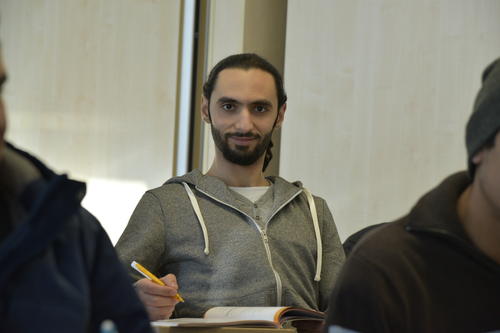A New Life and an Old Dream
Muhammed, a Syrian refugee, learns German at Freie Universität / March 15, 10 a.m.: Information Session for Refugees Who Want to Study
Mar 04, 2016
German language courses are being offered at Freie Universität for refugees interested in enrolling at the university.
Image Credit: exopixel, Fotolia
Muhammed, who hopes to become an English teacher, is currently taking a German course to take qualify for enrollment in a degree program.
Image Credit: Annika Middeldorf
Talking in coherent sentences about experiences, hopes, and goals – according to the European framework of reference for languages, language learners have to be able to do this at a certain level of learning. Muhammed’s German language skills are not yet quite up to the task; he still feels more comfortable in English at this point. Now 25, Muhammed fled the Syrian capital city, Damascus, three years ago. For almost two months now, he has been visiting the Lankwitz campus of Freie Universität three days a week to attend a German language course designed for refugees who are interested in studying at a German university. He still finds it easier to talk about it in English right now.
“The class is challenging. I’m really learning a lot. And the mood in the classroom is good,” Muhammed says. It is a highly motivated group: After all, German language proficiency means more to the participants than just the ability to find their way around in their new home. In many degree programs, adequate German language skills are a prerequisite for those who wish to start a regular program. With this in mind, as part of its Welcome to Freie Universität Berlin program, Freie Universität has set up German language classes for refugees who are interested in embarking on a degree program.
Rapid Progress in Learning German
To determine interim results and establish areas of focus in the course content, each course is divided into three consecutive modules. This benefited Muhammed: “At my teacher’s suggestion, I skipped one module because I had made progress quickly,” he says. In his everyday life, too, Muhammed seizes every opportunity to speak German. The fact that he has German friends in Berlin makes that easier. “A lot of my friends in Berlin are students at Freie Universität. They told me about the welcome program,” Muhammed says.
Mohammed Could No Longer Feel Safe in Damascus
His nationality is the most common among the program’s German learners, with Syrians making up more than 80 percent of course participants. Men predominate in the classroom – the figure for Muhammed’s module is almost 90 percent. In most cases, the young men are the first to be sent away by their families. Muhammed was worried that he would be forced to perform military service in Syria. He had also supported and organized protests against the government in 2011. “I was arrested by the police at one demonstration. I was lucky they didn’t throw me in jail. But from then on, they knew my address. I couldn’t feel safe in the city anymore,” Muhammed says. That is also why his full name is being withheld. In Syria, members of the opposition are summarily locked up, he says.
He had studied at Damascus University for several semesters in hopes of becoming an English teacher. “All I needed to do was take the final exams,” he says. But the pressure to leave the country was too great. Muhammed left the country with his brother, a trained dental technician. The two of them first traveled to Egypt via Lebanon as they fled. They stayed there for a year, moving on after that to Turkey and, finally, Germany. Instead of continuing his studies as he had planned, Muhammed had to do odd jobs to make ends meet during the years he spent fleeing Syria.
Syria – Egypt – Turkey – Germany
In Istanbul, where he was unable to work legally as a Syrian refugee, he was utterly subject to his employer’s whims. “I had to work as much as 14 hours a day in a sewing workshop,” he reports. After a year, the brothers decided to leave the city on the Bosporus. “Fleeing from Istanbul to Berlin was the hardest part – and the most expensive,” Muhammed says. The brothers paid 10,000 euros, most of it to traffickers. “Germany is where we have the best prospects of having a future. That’s why we definitely wanted to get here,” he explains.
A future – to Muhammed, that also means going back to school. He has not given up on the dream of becoming an English teacher. He hopes to start studying at Freie Universität this coming winter semester. By then he will be able to talk about his experiences, hopes, and goals in German, too.
Further Information
Information Session for Refugees Interested in Studying at a University
On Tuesday, March 15 at 10 a.m., there will be an information session in English about the Welcome to Freie Universität Berlin program. Employees of Freie Universität will provide information about advisory services, admission requirements for degree programs, German classes, and the year-long college preparatory course offered by the Studienkolleg of Freie Universität Berlin. The event is public, and admission is free. Registration is not required.
Time and Location
- Tuesday, March 15, 2016, 10 a.m. to 12 noon
- Freie Universität Berlin, Habelschwerdter Allee 45, Lecture Hall 2, 14195 Berlin-Dahlem (subway station: Thielplatz, U 3)
Anyone interested in studying at the university may also contact the General Academic Advising Office of Freie Universität directly. The Student Service Center on Iltisstr. 4, 14195 Berlin (subway station: Dahlem-Dorf, U 3) is open Monday through Thursday from 9 a.m. to 5 p.m. and Friday from 9 a.m. to 3 p.m. Information can also be given by phone (Tel.: +49 30 838 700 00 or +49 30 838 77770) or by email: Info-Service@fu-berlin.de.


